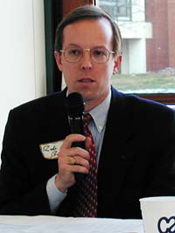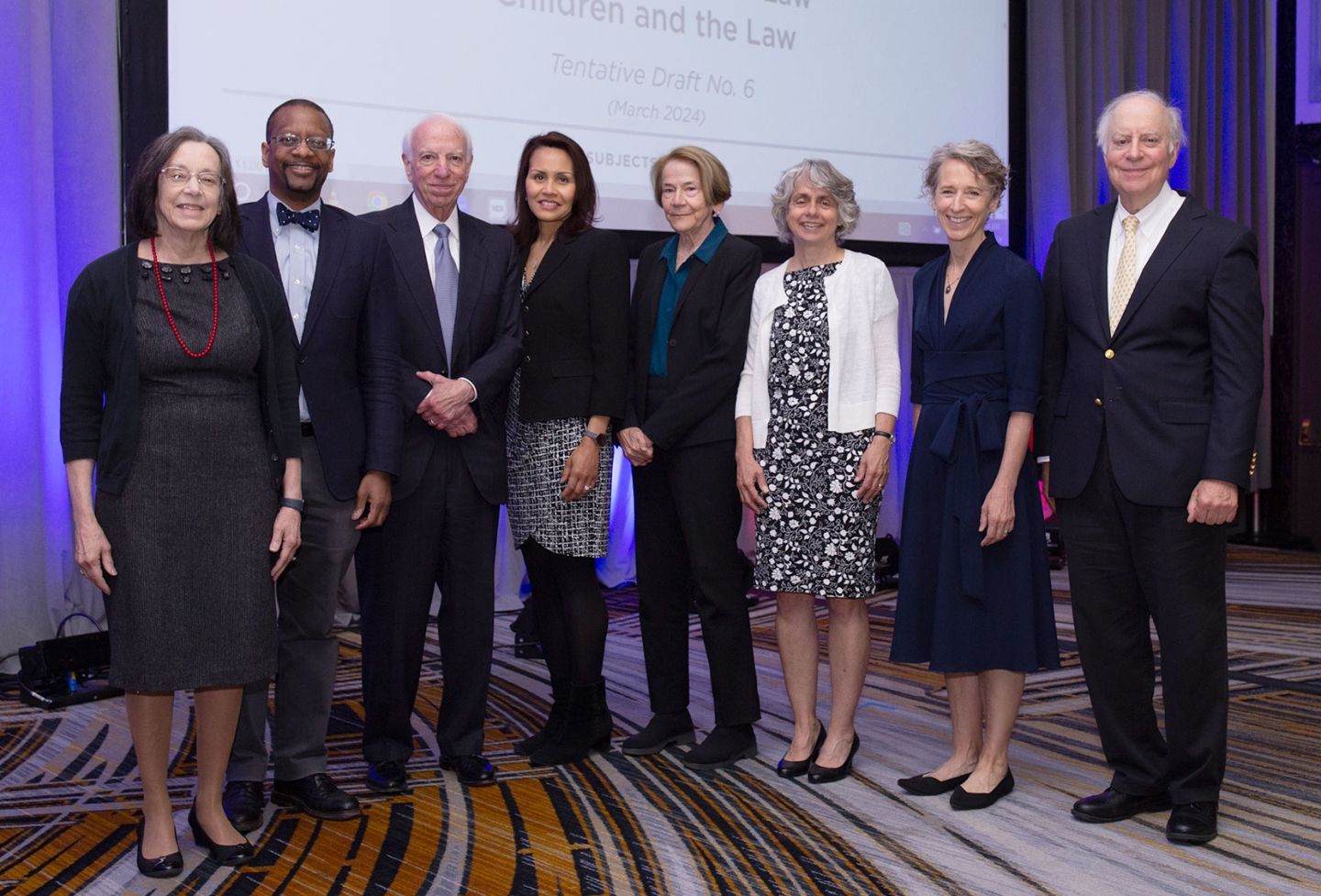VA Lawmakers: Tax Hike to Increase Family, Education Funds Unlikely




Armed with statistics suggesting that juveniles and families are suffering from state government policies, a mixed bag of concerned citizens, law students, and community workers pleaded with Virginia lawmakers to improve funding for education and other programs designed to help families.
Virginia delegates Rob Bell (R-58th District), Steve Landes (R-25th District) and Mitch Van Yahres (D-57th District) heard citizens' concerns Dec. 10 at the Legislative Forum on Children and Families, but said it is unlikely the state will raise taxes in any significant way in the upcoming election-year term because of the remaining $1 billion-plus budget shortfall. The delegates urged audience members who want to protect programs that work well to contact Virginia legislators with results in hand. The forum was sponsored by the Commission on Children and Families, Piedmont CASA, and the Mortimer Caplin Public Service Center.
After brief introductory remarks, the delegates answered questions on a number of issues including juvenile crime prevention, nutritional programs, the chances for a tobacco tax increase, education and program funding concerns.
Pamphlets distributed at the forum noted that Virginia detains juveniles at a higher rate than the national average: in 1997, the national detention rate was 95 juveniles per 100,000, while Virginia's rate was 168 per 100,000.
"We have to look at the source of juvenile crime and invariably it's the family," Van Yahres said. He added that parental drug abuse is the most common source of juvenile delinquency and said local programs like the Drug Court — a rehabilitative program for drug offenders — have helped. "We have to get them out of their environment in some cases," he added. But not all children can remain with addicted parents, and residential programs are expensive.
Several audience members lambasted Virginia policies that pump a higher proportion of money into public safety — the Department of Corrections and the police — than into education or public welfare programs, where money may be more needed and better used. Studies from 1998-2001 show that children receiving free or reduced-price lunches have a lower passing rate in eighth-grade standards of learning (SOL) tests than children who do not; the trend could create a crisis for students from low-income families when they are required to pass SOL tests to graduate high school beginning in 2004. Virginia ranks third in police and corrections spending nationally and 15th in highway maintenance construction, but only 27th in K-12 and higher education and 38th in public welfare, hospitals and health spending, according to the Virginia General Assembly Joint Legislative Audit and Review Commission.
"I would agree that the Department of Corrections estimates … need to be looked at," Landes said. "There are problems with the system."
Such problems, Bell said, should be resolved before lawmakers consider raising taxes.
"Even with the car tax rebates they're paying more in taxes," Bell said, noting that families are paying about $1200 more in income taxes than a decade ago. "I don't think [taxes are] an appropriate response right now."
Having cut about $5 billion from the state budget so far, legislators and the governor still need to make additional cuts. Van Yahres said he was drafting legislation to eliminate the car tax rebate entirely, although he said "it's not going to happen" in the real world. He also advocated a surcharge on personal income and corporate income taxes of 5 percent of the taxes paid, to be sunset in two years, and said the state should rein in the tax loophole that exempts the elderly by limiting it to those who make under $50,000 a year.
Landes said he would support reforms that would give counties the same power to tax as cities now have, and possibly offset the burden of reduced state funds. Overall he doubted any major change during this term. "No one wants to bring forward a proposal to increase taxes during an election year," he said.
Supporters of a tax on tobacco urged the delegates to "attack the sacred cow" to help ease budgetary woes. Bell said it was a "terrible time" to raise any taxes because people are already hurt by layoffs and the effects of the recession. Because more low-income earners smoke, "the weight will be borne by people who can bear it the least," he said.
Van Yahres disagreed and said that studies have shown that increasing the price of a pack of cigarettes by 50 cents will reduce teen smoking by 17 percent. "What is a more regressive sales tax than the tax on food or clothing?" He said there's a good chance of a small token tax raise, although the hike likely would not have a large impact.
Audience member Bruce Copeland decried the lack of responsible leadership among Virginia legislators.
"We in Virginia have more of an attitude problem than a revenue problem," he said. "I'm also looking for leaders in my legislators more than 'representation.'" Even in the 1990s when funds were more abundant Virginia did not put education first, he said.
Landes said some of the problems come from state institutions. "Bureaucracies grow and they take more and more money," he said, citing the Department of Corrections again. "You can't solve these problems in a two-year term."
One audience member denounced Virginia's recent cooperation with the federal government to have alleged sniper John Lee Malvo tried in the state when money is tight, since the costs of the death penalty trial may reach into the millions.
"I think it's obscene what we did — to lobby to try the snipers," Van Yahres said. Ashcroft pushed the state to do it, and the cost ends up being a burden to the locality it's tried in, Prince William County, he said. After the prosecutor runs out of local and federal funds, he likely will ask for money from the state, which will probably agree to comply.
Bell said the pain allegedly caused by Malvo warrants the death penalty even though he's a juvenile. Landes also said he supported the death penalty for juvenile offenders in aggravating first-degree murder cases, but Van Yahres said he opposes the death penalty completely.
"We have to be careful about how we treat juveniles," he said. He said many such youth think they won't live long anyway, so the prospect of dying a couple years early does not deter them from crime.
Van Yahres also raised concerns about the federal government's No Child Left Behind Act, which he said will "kill" the states, which can't survive the demands of the legislation without supportive funding. The policy requires states to develop their own standards and tests for students and report results to the public in an effort to hold schools accountable. Without supportive funds, Van Yahres said, the result will be more dumping of responsibilities on localities.
In order to sift through funding issues, Landes advocated performance-based funding, which would allow programs that work to continue to receive funding. Van Yahres noted that often programs are cut because no one is there to advocate for them. Bell similarly asked the audience to tell him the most important issue they want him to work on, so he can keep track of it during sessions that include as many as 2000 bills.
Landes and Bell said the state could better distribute to localities funds provided by the 1993 Comprehensive Services Act, which established a pool of funding streams designed to help at-risk youth. Landes said there is increased talk of the state taking over funding controlled by the CSA; they may have more services provided in-state to curb costs. He added that he is aware of several vacant buildings that could be converted to facilities or residential schools for the handicapped or at-risk youth.
During the forum, the delegates could agree on one issue: the state should do more to combat the escalating rate of childhood obesity, the effects of which increase health costs for all Virginia residents.
"I think we can give guidelines," regarding nutrition, Van Yahres said. Bell added, "You'd be astonished at how poor [juveniles'] knowledge of nutrition is."
Landes said making the state's residents healthier could have the largest impact of anything legislators can do. "If we can do that, I think we will have accomplished a lot."
Founded in 1819, the University of Virginia School of Law is the second-oldest continuously operating law school in the nation. Consistently ranked among the top law schools, Virginia is a world-renowned training ground for distinguished lawyers and public servants, instilling in them a commitment to leadership, integrity and community service.


